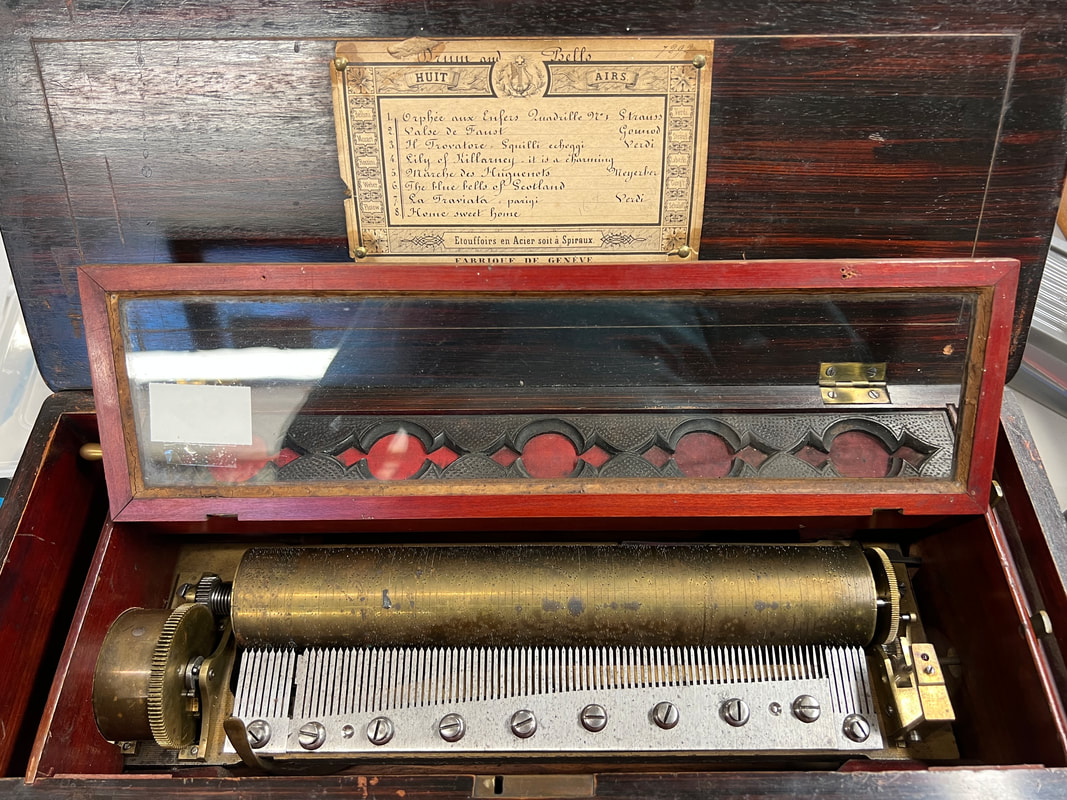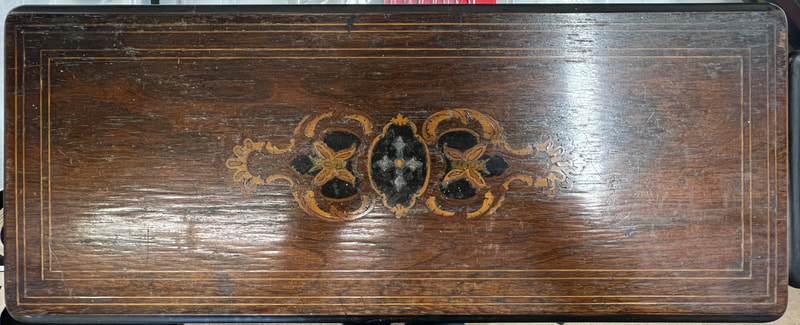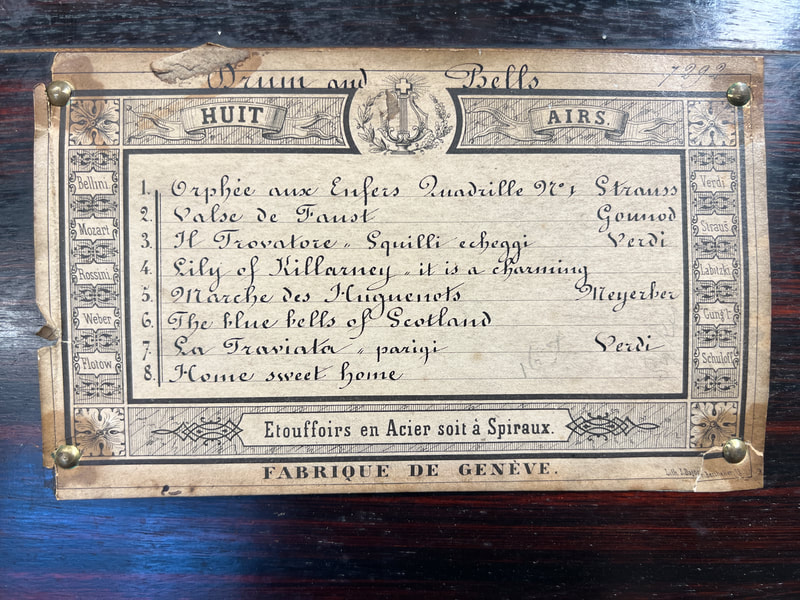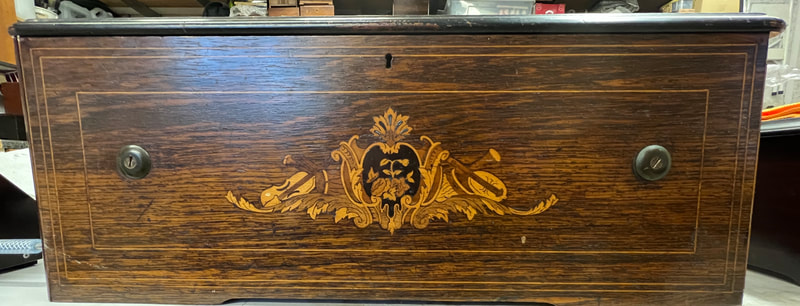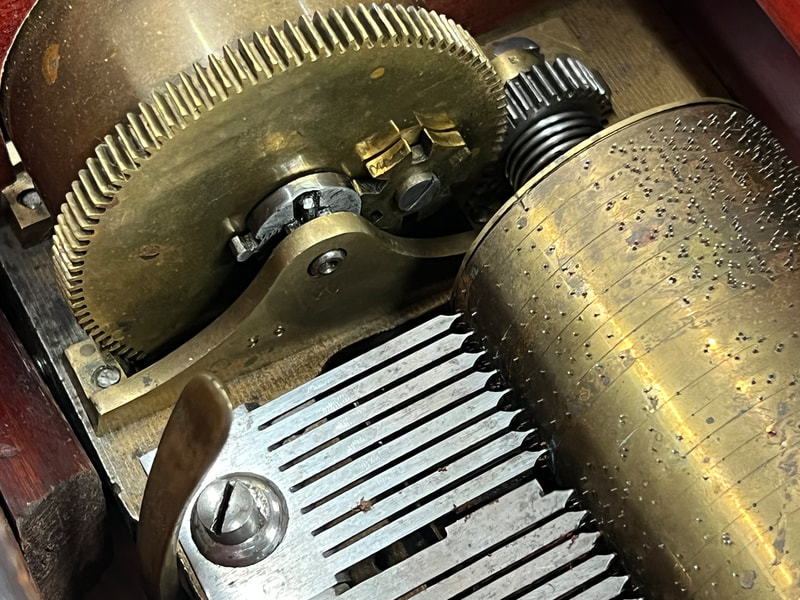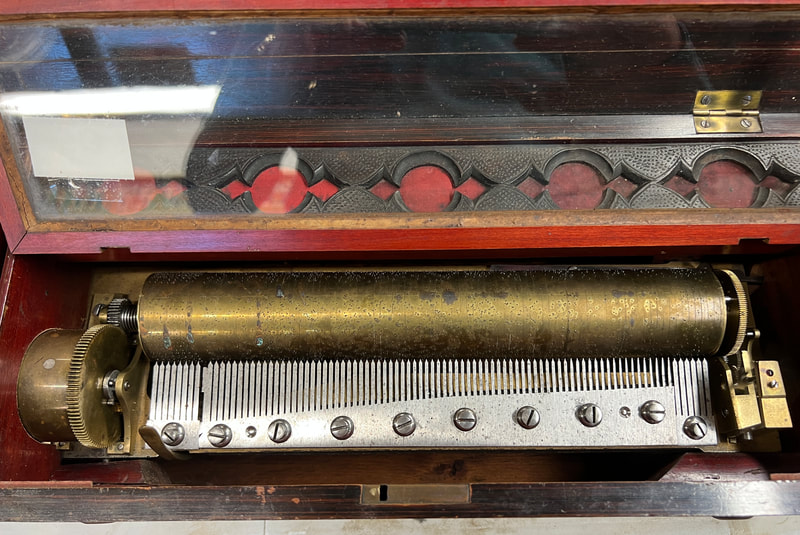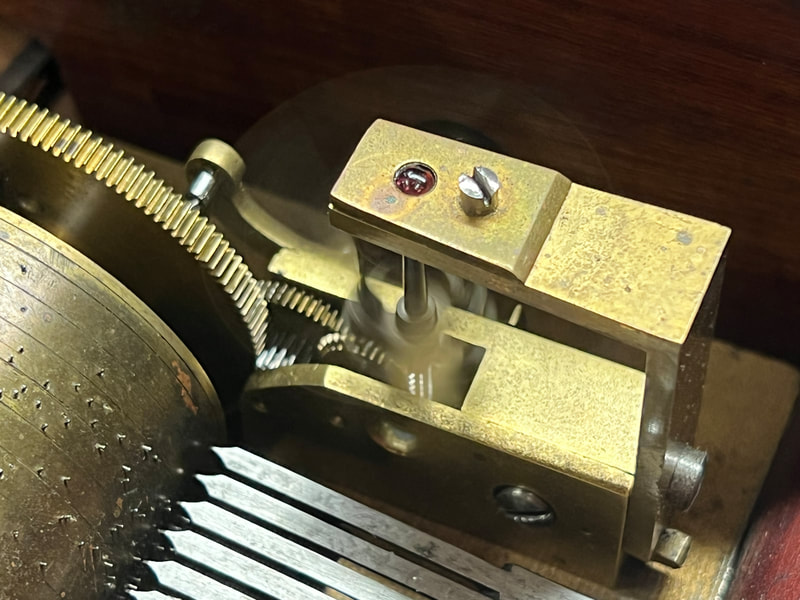8/77 Bremond serial no 7292 with hidden bells and drum circa 1862
I'd been looking for a good Bells & Drum box for some time and just missed one similar to this at auction.
Purchased from a private seller that I've bought several small quality boxes from from in the past.
Part of the estate of a past President of the Music Box Society of Great Britain, so I was confident that it would be worth buying.
Purchased from a private seller that I've bought several small quality boxes from from in the past.
Part of the estate of a past President of the Music Box Society of Great Britain, so I was confident that it would be worth buying.
The box is in an unrestored condition and was made around 1862.
There is very little evidence of it being dismantled and it's pretty dirty. Quite a few pins are bent, but I can't see any missing.
The lid and front have some quality marquetry, although the lid has some damage and is missing four brass inlays.
One corner is missing a strip of mahogany, but otherwise its sound.
The mechanism is in good working order and the tunes have lovely arrangements.
I'm looking forward to getting this box back to its former glory in 2024.
There is very little evidence of it being dismantled and it's pretty dirty. Quite a few pins are bent, but I can't see any missing.
The lid and front have some quality marquetry, although the lid has some damage and is missing four brass inlays.
One corner is missing a strip of mahogany, but otherwise its sound.
The mechanism is in good working order and the tunes have lovely arrangements.
I'm looking forward to getting this box back to its former glory in 2024.
Tunes
Tune 1 - Orphan aux Enfers - Quadrille no 1. by Strauss
is a comic opera composed by Jaques Offenbach to a French text written by Ludovic Halévy.
Orpheus in the Underworld was first performed as a two act opera in Paris on 21st October 1858 and was extensively revised and expanded in a four act 'opéra féerie" version presented at the Théâtre de la Gaîté in Paris on 7th February 1874.
is a comic opera composed by Jaques Offenbach to a French text written by Ludovic Halévy.
Orpheus in the Underworld was first performed as a two act opera in Paris on 21st October 1858 and was extensively revised and expanded in a four act 'opéra féerie" version presented at the Théâtre de la Gaîté in Paris on 7th February 1874.
Tune 2 - Valse de Faust by Gounod
is an opera in five acts by Charles Gounod to a French libretto by Jules Barbierand Michel Carré from Carré's play Faust et Marguerite, in turn loosely based on Johann Wolfgang von Goethe's Faust, Part One. It debuted at the Théâtre Lyrique on the Boulevard du Temple in Paris on 19 March 1859. The opera was given for the first time in Italy at La Scala in 1862 and in England at Her Majesty's Theatre, London (in Italian) in 1863
is an opera in five acts by Charles Gounod to a French libretto by Jules Barbierand Michel Carré from Carré's play Faust et Marguerite, in turn loosely based on Johann Wolfgang von Goethe's Faust, Part One. It debuted at the Théâtre Lyrique on the Boulevard du Temple in Paris on 19 March 1859. The opera was given for the first time in Italy at La Scala in 1862 and in England at Her Majesty's Theatre, London (in Italian) in 1863
Tune 3 - Il Travatore Squilli Echeggi ('The Troubadour') by Verdi
is an opera in four acts by Giuseppe Verdi to an Italian libretto largely written by Salvadore Cammarano, based on the play El trovador (1836) by Antonio García Gutiérrez.The premiere took place at the Teatro Apollo in Rome on 19 January 1853, where it "began a victorious march throughout the operatic world", a success due to Verdi's work over the previous three years.
is an opera in four acts by Giuseppe Verdi to an Italian libretto largely written by Salvadore Cammarano, based on the play El trovador (1836) by Antonio García Gutiérrez.The premiere took place at the Teatro Apollo in Rome on 19 January 1853, where it "began a victorious march throughout the operatic world", a success due to Verdi's work over the previous three years.
Tune 4 - Lily of Killarney it is charming by Julius Benedict is an opera in three acts.. The libretto, by John Oxenford and Dion Boucicault, is based on Boucicault's own play The Colleen Bawn. The opera received its premiere at Covent Garden Theatre, London on Monday 10 February 1862.
Tune 5 - Marche des Huguenots
is an opera by Giacomo Meyerbeer and is one of the most popular and spectacular examples of grand opera. In five acts, to a libretto by Eugène Scribe and Émile Deschamps, it premiered in Paris on 29 February 1836. Other first performances included London (Covent Garden Theatre), 20 June 1842, and New Orleans (Théâtre d'Orléans) on 29 April 1839. Due to its subject matter it was sometimes staged under different titles such as The Guelfs and the Ghibellines (in Vienna before 1848), Renato di Croenwald in Rome, or The Anglicans and the Puritans (in Munich), to avoid inflaming religious tensions among its audiences
is an opera by Giacomo Meyerbeer and is one of the most popular and spectacular examples of grand opera. In five acts, to a libretto by Eugène Scribe and Émile Deschamps, it premiered in Paris on 29 February 1836. Other first performances included London (Covent Garden Theatre), 20 June 1842, and New Orleans (Théâtre d'Orléans) on 29 April 1839. Due to its subject matter it was sometimes staged under different titles such as The Guelfs and the Ghibellines (in Vienna before 1848), Renato di Croenwald in Rome, or The Anglicans and the Puritans (in Munich), to avoid inflaming religious tensions among its audiences
Tune 6 - The Blue Bells of Scotland is the usual modern name for a Scottish folksong. It was written by Dora Jordan, an English actress and writer. First published in 1801. Joseph Haydn wrote a piano trio accompaniment for this song. George Eugene Griffin incorporated the tune into his Piano Concerto No. 1 in 1797, which became a popular success in England. It was published in 1805.
Tune 7 - La Traviata Parigi (The Fallen Woman) by Giuseppe Verdi is an opera in three acts set to an Italian libretto by Francesco Maria Piave. It is based on La Dame aux camélias (1852), a play by Alexandre Dumas fils adapted from his own 1848 novel. The opera was originally titled Violetta, after the main character. It was first performed on 6 March 1853 at La Fenice opera house in Venice.
Tune 8 - Home Sweet Home
is an American Civil War song, originally an opera called Clari, or The Maid of Milan. The lyrics were written by John Howard Payne and set to music composed by Sir Henry Bishop in 1823
is an American Civil War song, originally an opera called Clari, or The Maid of Milan. The lyrics were written by John Howard Payne and set to music composed by Sir Henry Bishop in 1823
